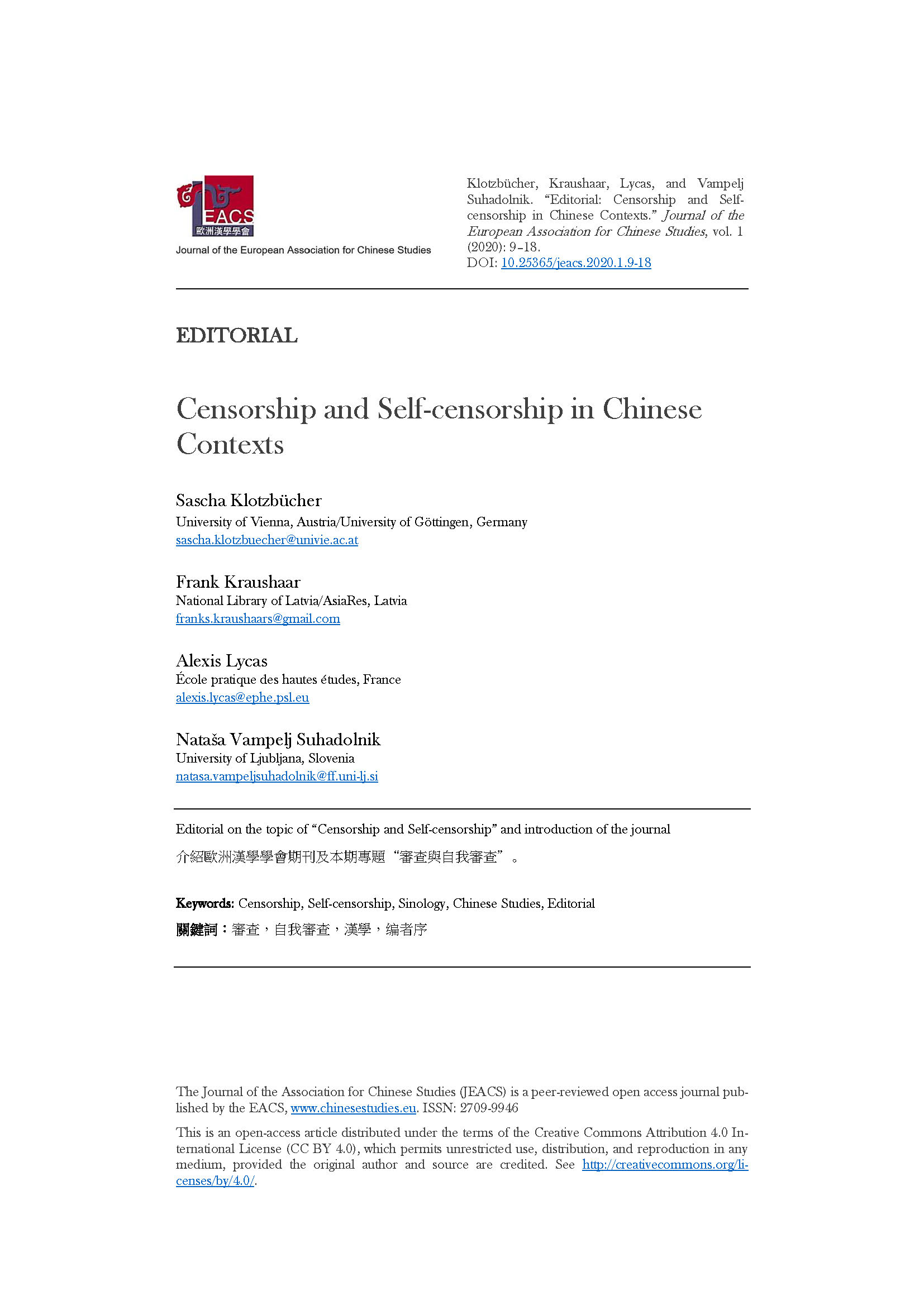Censorship and Self-censorship in Chinese Contexts
DOI:
https://doi.org/10.25365/jeacs.2020.1.9-18Keywords:
Censorship, Self-censorship, Sinology, Chinese Studies, Editorial, 審查, 自我審查, 漢學, 编者序Abstract
Editorial on the topic of “Censorship and Self-censorship” and introduction of the journal
介紹歐洲漢學學會期刊及本期專題“審查與自我審查”。
Downloads
References
Bakken, Børge. 2006. The Exemplary Society: Human Improvement, Social Control, and the Dangers of Modernity in China. Oxford: Oxford University Press.
Bandurski, David. 2013. “Parsing the ‘Public Opinion Struggle’”. China Media Project, September 24, 2013. Accessed December 28, 2020. https://chinamediaproject.org/2013/09/24/parsing-chinas-public-opinion-struggle/.
Bandurski, David. 2020. “Red Convergence.” China Media Project, November 23, 2020. Accessed December 28, 2020. https://chinamediaproject.org/2020/11/23/red-convergence/.
Behar, Ruth. 1996. The Vulnerable Observer. Anthropology that Breaks your Heart. Boston: Beacon Press.
Brady, Anne-Marie. 2017. “Magic Weapons. China's Political Influence Activities under Xi Jinping.” Accessed May 16, 2018. https://www.wilsoncenter.org/sites/default/files/media/documents/article/magic_weapons.pdf.
Carrico, Kevin. 2018. “China Studies between Censorship and Self-censorship.” Made in China, July 17, 2018. Accessed August 07, 2018. http://www.chinoiresie.info/china-studies-between-censorship-and-self-censorship/.
Cheek, Timothy. 2015. The Intellectual in Chinese History. Cambridge University Press.
Crevel, Maghiel van. 2017. “Walk on the Wild Side: Snapshots of the Chinese Poetry Scene.” Modern Chinese Literature and Culture, December 2017. Accessed August 13, 2019. https://u.osu.edu/mclc/online-series/walk-on-the-wild-side/.
Document 9: A ChinaFile Translation. How Much Is a Hardline Party Directive Shaping China’s Current Political Climate? November 8, 2013. Accessed October 26, 2014. http://www.chinafile.com/document-9-chinafile-translation.
Esherick, Joseph. 2014. “On Dealing with Chinese censors.” ChinaFile. October 14, 2014. Accessed December 15, 2014. http://www.chinafile.com/reporting-opinion/viewpoint/dealing-chinese-censors.
Evasdottir, Erika E. S. 2004. Obedient Autonomy: Chinese Intellectuals and the Achievement of Orderly Life. Vancouver: UBC Press.
Greatrex, Roger. 2014. Report: The deletion of pages from EACS Conference materials in Braga (July 2014). EACS European Association for Chinese Studies. Accessed March 03, 2021. http://chinesestudies.eu/?p=584.
Greitens, Sheena Chestnut and Rory Truex. 2019. ”Repressive Experiences among China Scholars: New Evidence from Survey Data.” The China Quarterly, Volume 242, June 2020, 349–75. https://doi.org/10.1017/S0305741019000365
Hamilton, Clive. 2018. Silent Invasion: China's Influence in Australia. Richmond: Hardie Grant.
Hamilton, Clive and Mareike Ohlberg. 2020. Hidden Hand: Exposing how the Chinese Communist Party is Reshaping the World. Richmond: Hardie Grant.
Hamrin, Carol Lee und Timothy Cheek. (eds.) 1986. China's Establishment Intellectuals. Armonk, N.Y., M.E. Sharpe.
Hansen, Mette Halskov. 2006. “In the Footsteps of the Communist Party: Dilemmas and strategies.” In Doing Fieldwork in China, edited by Maria Heimer and Stig Thøgersen, 81–95. Copenhagen: NIAS Press.
Izambard, Antoine. 2019. France-Chine, les liaisons dangereuses: espionnage, business… Révélations sur une guerre secrète. Paris: Stock.
King, Gary, Jennifer Pan, Margaret E. Roberts. 2013. “How Censorship in China Allows Government Criticism but Silences Collective Expression.” American Political Science Review 107(2): 326–343. https://doi.org/10.1017/S0003055413000014
King, Gary, Jennifer Pan, Margaret E. Roberts. 2017. “American Political Science Review. How the Chinese Government Fabricates Social Media Posts for Strategic Distraction, Not Engaged Argument.” American Political Science Review 111(3): 484–501. https://doi.org/10.1017/S0003055417000144
Kjellgren, Bjørn. 2006. “The Significance of Benevolence and Wisdom – Reflections on Field Positionality.” In Doing Fieldwork in China, edited by Maria Heimer and Stig Thøgersen, 225–244. Copenhagen: NIAS Press.
Klotzbücher, Sascha. 2014. “‘Embedded Research’ in Collaborative Fieldwork.” Journal of Current Chinese Affairs 43(2): 65–85. https://doi.org/10.1177/186810261404300206
Klotzbücher, Sascha. 2019. Lange Schatten der Kulturrevolution. Eine transgenerationale Sicht auf Politik und Emotion in der Volksrepublik China. Gießen: psychosozial. https://doi.org/10.30820/9783837974188
Link, Perry. 2002. “China: The Anaconda in the Chandelier.” The New York Review of Books. April 22, 2002. Accessed December 19, 2020. https://www.chinafile.com/library/nyrb-china-archive/china-anaconda-chandelier.
Qiu, Jack Linchuan. 2009. “Censorship.” In Encyclopedia of Modern China, edited by David Pong, 172–174. Farmington Hills, MI: Charles Scribner's Sons/Gale Cengage Learning.
Sahlins, Marshall. 2015. Confucius Institutes. Academic Malware. Chicago: Prickly Paradigm Press.
Svarverud, Rune. 2010. “Individual Self-Discipline and Collective Freedom in the Minds of Chinese Intellectuals.” In China: The Rise of the Individual in Modern Chinese Society, edited by Mette Halskov Hansen and Rune Svarverud, 193–224. Copenhagen: NIAS Press.
Weber, Ralph. 2020. “Unified Message, Rhizomatic Delivery. A Preliminary Analysis of PRC/CCP Influence and the United Front in Switzerland.” Sinopsis. China in Context and Perspective. Accessed January 5th, 2021. https://sinopsis.cz/wp-content/uploads/2020/12/switzerland-rhizome.pdf.
Yang, Fan. 2014. “Rethinking China’s Internet Censorship: The Practice of Recoding and the Politics of Visibility.” New Media & Society 18(7): 1364–1381. https://doi.org/10.1177/1461444814555951
Zhao, Yuezhi. 1998. Media, Market, and Democracy in China: Between the Party Line and the Bottom Line. Urbana: University of Illinois Press.

Downloads
Published
Versions
- 2020-12-30 (2)
- 2021-03-07 (1)
How to Cite
Issue
Section
License
Copyright (c) 2020 Sascha Klotzbücher, Frank Kraushaar, Alexis Lycas, Nataša Vampelj Suhadolnik

This work is licensed under a Creative Commons Attribution 4.0 International License.
